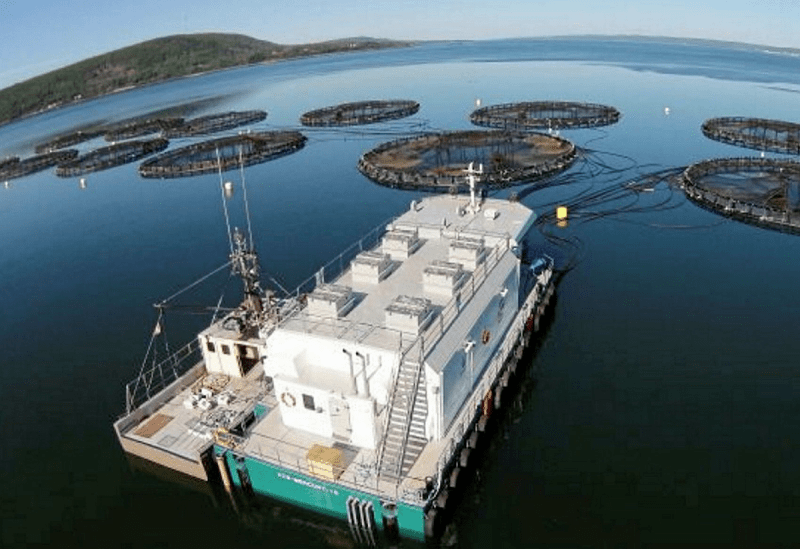Cooke Aquaculture forges ahead in Canada, U.S.
Cooke Aquaculture Inc. reaffirms its support for projects in Washington State and Nova Scotia
By SeaWestNews
The Atlantic Canadian salmon farming division of Cooke Aquaculture Inc. has reaffirmed its support to investing and creating marine and land-based jobs in the waters off Nova Scotia and Washington State.
“Our aim is to grow responsibly in Nova Scotia. And this means modest expansion, putting fish health and environmental sustainability at the forefront of our growth strategy,” said Joel Richardson, Vice President of Public Relations for Cooke Aquaculture.
Across the border, the company is moving forward with its plans to farm rainbow trout and has applied to the Washington Department of Ecology requesting to modify its remaining permits for four net pens in the state.
The permits are for Cooke’s Clam Bay, Fort Ward, Orchard Rocks and Hope Island net pens.
Washington state has passed a law to phase out all non-native finfish farming, such as Atlantic salmon farming and the company will not be allowed to operate in the state if it is not approved to switch to farming trout.
Cooke has a joint-venture with the Jamestown S’Klallam Tribe in Washington ‘to sustainably rear Northwest native species, which will require investment in new equipment and technology while supporting local jobs, the company said.
Kelly Cove Salmon Ltd., the Atlantic Canadian salmon farming division of New Brunswick’s family-owned Cooke Aquaculture Inc. has been sustainably operating Atlantic salmon farms for over twenty-two years in Nova Scotia. It currently produces farmed Atlantic salmon annually across twelve marine aquaculture sites along Nova Scotia’s Southern and Western shores.
“We rely on veterinarians, biologists and feed specialists for advice and oversight on our everyday farming practices. To date, farm management practices such as single year class stocking, enhanced biosecurity protocols, creation of bay management areas, reduced stocking densities, fish health monitoring and early intervention remain the industry’s best tools in proper rearing of healthy farmed seafood,” said Richardson.
“The current pandemic situation reminds us all that locally produced food is vital to food security in Canada and we are very proud of all our people working hard in Nova Scotia and throughout the world who are essential to supply grocery stores,” he said.
In Nova Scotia, 309 small and medium size businesses are in Cooke’s supply chain and they annually receive orders for over $51 million. Cooke’s annual contribution to the Nova Scotia economy is significant – $239.5 million in revenues output, $73.4 million in GDP, and 445 full time equivalent jobs. All this activity also generates consumer spending of $13.7 million.
Cooke’s commitment to forge ahead comes in the wake of Cermaq Canada, another major fish farming company, announcing it is stepping back from expansion investigations in Nova Scotia.
Cermaq was trying to identify enough farm sites to support 20,000 metric tonnes of production in order to make the potential expansion financially viable.
Over the last year, Cermaq Canada has been conducting feasibility and engagement work in the province through the Option to Lease process, within the province’s new aquaculture regulatory framework. The areas being investigated included Chedabucto Bay, St. Mary’s Bay, Mahone Bay and St. Margaret’s Bay.
“We knew that we would need to identify between 15 and 20 viable farm sites spread throughout the four Option areas in order to achieve the required annual production. Unfortunately, we were unable to locate enough sites at this time, and have made the decision to allow all of our Options to Lease to expire,” said David Kiemele, Managing Director for Cermaq Canada.
“We acknowledge there were many people interested in our potential investment as this kind of economic diversification can be very important to rural coastal communities. Aquaculture, such as salmon farming, will have an increasingly important role to play in responding to climate change and contributing to North American food security.”
“We did hear opposition from some groups and regions, however; a shared path forward is, and always was our goal. We engaged with the intent of supporting, or benefiting, existing commercial fishing through shared opportunities, services, research and planning,” said Linda Sams, Sustainable Development Director for Cermaq Canada.
“We think it was a lost opportunity that we didn’t get to have more in-depth conversations in some locations, but we would like to thank everyone who engaged with the intent to learn and share,” she said.
Image courtesy Cooke Aquaculture

